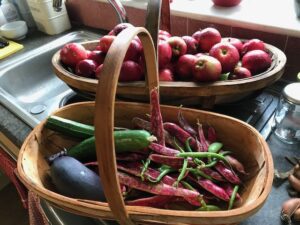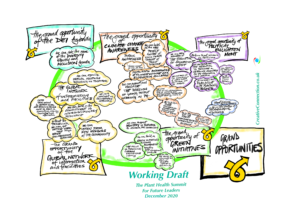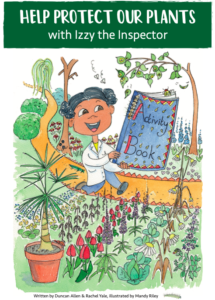Being a natural optimist,  this final blog on my IYPH2020 will focus on Hope and I hope you’ll stick with it to the final paragraph – the video is worth watching. Against the backdrop of truly difficult times, I want to end this blog series on IYPH 2020 with some positive examples, all which make me feel good and give me strength to build on.
this final blog on my IYPH2020 will focus on Hope and I hope you’ll stick with it to the final paragraph – the video is worth watching. Against the backdrop of truly difficult times, I want to end this blog series on IYPH 2020 with some positive examples, all which make me feel good and give me strength to build on.
I start with the Plant Health Summit for Future Leaders project that I referred to in September https://celiaknightconsulting.co.uk/international-year-of-plant-health-september-2020/. 150 early career professionals from 60 organisations have already joined this conversation with energy and enthusiasm. You can see how the conversation is developing here https://planthealth.rsb.org.uk/the-conversation.html and in January we will begin to use these pictures to shape the format of the March summit and invite mentors to participate. I particularly like the emergence of Grand Opportunities in this conversation (as seen in this working draft image) and hope these will help all our early career professionals build networks and confidence in addressing the global challenges in plant health. Anyone still wanting to join the conversation is welcome to get in touch. The hope and energy in this project and the wonderful colleagues I’m working with will help me to stay positive in 2021 too.
particularly like the emergence of Grand Opportunities in this conversation (as seen in this working draft image) and hope these will help all our early career professionals build networks and confidence in addressing the global challenges in plant health. Anyone still wanting to join the conversation is welcome to get in touch. The hope and energy in this project and the wonderful colleagues I’m working with will help me to stay positive in 2021 too.
Increasingly I see some really brilliant examples of plant health-related educational resources or routes of dissemination. The activity book Izzy the Inspector has great potential to be a widely available resource with underpinning educational value – it’s free now to download https://www.yearofplanthealth.co.uk/izzy-inspector-book. Hopefully investment into its marketing will help it go far. This BBC4 brief video https://twitter.com/BBC/status/1335992718531715073 on soil packs a punch and has potential to be picked up by so many at different levels. I also learn from Twitter where plant health resources are available and OUP have made 12 academic resources free until the 31st December as a result of IYPH – so grab these quick if they’re relevant to you. https://twitter.com/OxfordJournals/status/1334803650447769600
educational resources or routes of dissemination. The activity book Izzy the Inspector has great potential to be a widely available resource with underpinning educational value – it’s free now to download https://www.yearofplanthealth.co.uk/izzy-inspector-book. Hopefully investment into its marketing will help it go far. This BBC4 brief video https://twitter.com/BBC/status/1335992718531715073 on soil packs a punch and has potential to be picked up by so many at different levels. I also learn from Twitter where plant health resources are available and OUP have made 12 academic resources free until the 31st December as a result of IYPH – so grab these quick if they’re relevant to you. https://twitter.com/OxfordJournals/status/1334803650447769600
At the beginning of this year I thought my challenge would be to find ways to share the importance of plant health with friends and family. Now, due to the pandemic and also Brexit, at least most of the people I know get this. What can we all do? We can continue to make changes to our daily lives to improve sustainability e.g reduce waste, consider the environment etc and we can talk to each other about what we’ve done and why. In the ongoing troubled times, finding and giving support is so important. When I set out last December to write a monthly blog through 2020 to link the importance of plant health to my daily life, I could not imagine I would be writing this from  Maggie’s Cancer Caring Centre https://www.maggies.org while my husband Simon received treatment from the wonderful NHS – all in the midst of a pandemic. The calm and supportive atmosphere at Maggie’s in Leeds has already helped me cope with my stresses. I love the evident greenery there too.
Maggie’s Cancer Caring Centre https://www.maggies.org while my husband Simon received treatment from the wonderful NHS – all in the midst of a pandemic. The calm and supportive atmosphere at Maggie’s in Leeds has already helped me cope with my stresses. I love the evident greenery there too.
Until last year I wasn’t fully aware of the value of the FAO’s International year designations, but I now see how they can mobilise focus on significant global issues. I’m pleased to see that 2021 will be the International year of fruit and vegetables and this video https://www.youtube.com/watch?v=9h1kLcKUAfM shows us all how we can help feed ourselves and build enterprises, wherever in the world we live. So there’s plenty of hope there and scope for future blogs!
Wishing everyone strength to ride their storms and hope for 2021.

Comments 2
Loved the soil video and the international fruit and veg growing video. What can we ordinary urban gardeners do to preserve or increase soil – does composting count? And is it possible to justify the food miles in buying veg from Kenya?
Author
Glad you like the videos. Any improvement we make to our garden soil will help and this doesn’t need to be done at the expense of buying in soil – especially not peat. Recycle as much of your own waste as you can, kitchen, cuttings, leaves etc. If your garden is tidy, the compromise might need to be allocating a little space for composters and having patience to get the process started, but it’s satisfying when you enrich your soil for free. As to food miles, local and seasonal is the most sustainable in my opinion.